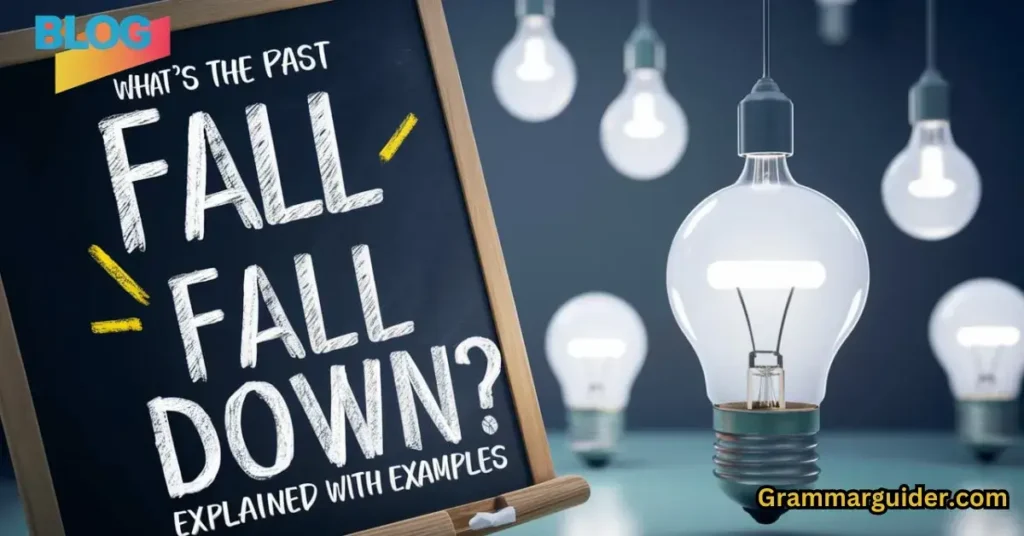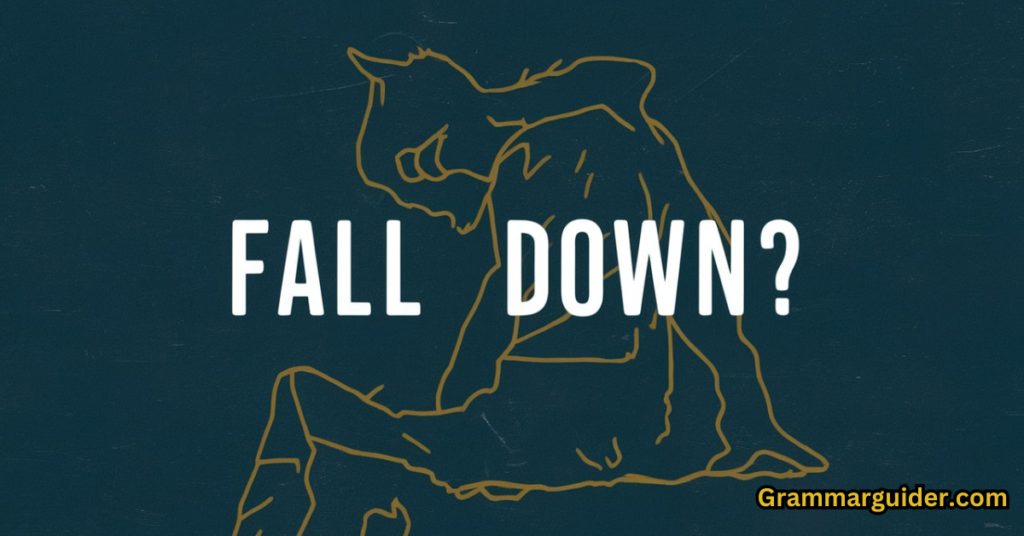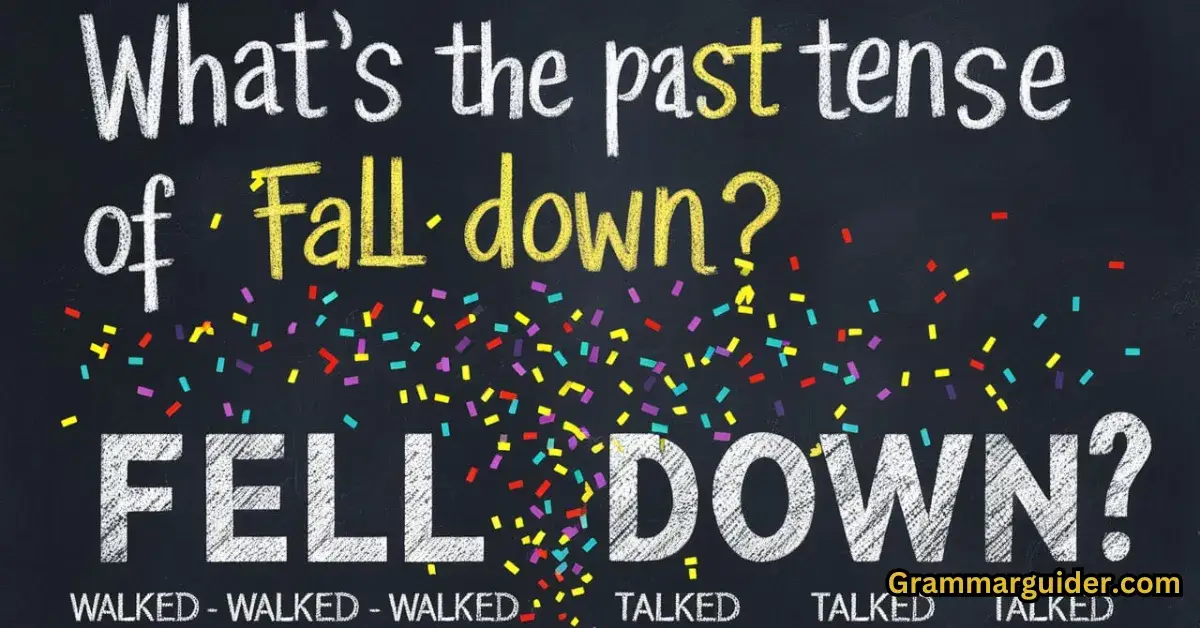Understanding verb tenses in English can sometimes feel tricky, but it’s essential for speaking and writing clearly. When it comes to the past tense of fall down, many learners get confused about which form to use. This article will break down the past tense of fall down and provide clear, everyday examples, so you’ll know exactly when and how to use it.
Let’s dive in and explore the past tense of fall down, how it’s used, and provide some real-life examples.
The Simple Past Tense of “Fall Down”
What is the Simple Past Tense of “Fall Down”?
In English, regular verbs typically form the past tense by adding -ed to the base form (e.g., “walk” becomes “walked”). However, “fall” is an irregular verb, meaning it doesn’t follow the regular pattern. So, the past tense of fall down is “fell down.”
You may already be familiar with the verb fall in its base form, as in “I fall every time I try to dance.” But when you want to talk about something that happened in the past, you need the past tense form: fell down.
For example:
- “I fell down while I was jogging.”
- “She fell down the stairs last night.”
Why Is “Fell Down” the Past Tense?
Unlike regular verbs that form the past tense by adding -ed, fall is an irregular verb that changes its form entirely when used in the past. This is why fell is the correct past tense form of fall, and fell down is how you describe someone having fallen down in the past.

Real-Life Examples of “Fell Down”
Let’s break it down with more examples in different contexts so you can see how the past tense of fall down is used:
Scenario 1: Writing an Email to a Friend
Imagine you’re telling your friend about a minor accident that happened earlier today. You’d write something like:
Subject: I Fell Down Today!
Hi Rachel,
I just wanted to let you know about my little mishap earlier. I was rushing to meet Sarah for coffee, and I tripped over a curb and fell down! Thankfully, I wasn’t hurt too badly, but my knee is a bit sore. I’m resting now, and it should be okay.
I hope you’re doing well!
Take care,
Ava
In this email, the phrase “fell down” is used to describe the action of falling that happened in the past.
Scenario 2: Writing a Report
In formal contexts, like writing a work report, the past tense of fall down is still useful. Here’s an example:
Accident Report:
At approximately 3:00 PM, employee John Michaels fell down in the warehouse. Initial reports suggest that he lost his footing due to wet floors. He was immediately attended to by the on-site first-aid team. Further investigation will be carried out to determine if safety measures need to be improved.
In this case, the fall down past tense is used to describe the incident that occurred in the past.
Scenario 3: A Narrative Example
You might also encounter this phrase in a story. For example:
As the rain poured down, Jessica tried to rush home, but the slippery sidewalk made her lose her balance. She fell down, landing with a soft thud. Dazed, she quickly stood up, checking herself for injuries.
Here, “fell down” serves to describe the action that happened during the past event in the story.
Scenario 4: Texting a Family Member
When telling a family member about something that happened, you might say:
“Hey Mom, just wanted to let you know that I fell down while playing soccer with the kids. Don’t worry, though—I’m fine. Just a little bruised.”
In informal communication, you often see “fell down” used to quickly explain past events.

Using “Fell Down” in Different Tenses
Present Tense: “Fall Down”
When you’re talking about an action happening now or regularly, you use fall (the base form).
Example:
- “I fall down sometimes when I’m not paying attention.”
In this case, you’re talking about something that regularly happens, not an event in the past.
Future Tense: “Will Fall Down”
When you want to talk about a potential fall in the future, you use the phrase “will fall down.”
Example:
- “I’m sure I will fall down if I try to climb that tree.”
This uses the modal verb “will” to express a future possibility.
Table: Tense Forms of “Fall Down”
| Tense | Verb Form | Example Sentence |
|---|---|---|
| Present Simple | fall down | “I always fall down when I’m tired.” |
| Simple Past | fell down | “I fell down when I was running yesterday.” |
| Future Simple | will fall down | “You will fall down if you don’t watch where you’re going.” |
Common Mistakes with “Fell Down” and How to Avoid Them
Many learners confuse the past tense of fall with its other forms. Let’s address a few common errors.
Mistake 1: Confusing “Fall” with “Fallen”
Some people mistakenly say, “I have fall down” instead of “I have fallen down.” Remember, fallen is the past participle, which is used with auxiliary verbs like have or had. The correct phrase would be “I have fallen down.”
Mistake 2: Overuse of the Passive Voice
While it’s grammatically correct to say “I was fallen down,” it sounds awkward and unnatural. In most cases, it’s better to use the active voice, as in “I fell down.”
Mistake 3: Using “Fell Down” in the Present
Sometimes, learners make the mistake of using “fell down” in the present tense. This would be incorrect since “fell down” is past tense. You should only use “fell down” when referring to something that has already happened.
Why Knowing the Past Tense of “Fall Down” Matters
Understanding and using the fall down past tense correctly helps you express past actions clearly. Whether you’re writing an email, telling a story, or giving a report, using the correct tense makes your message more precise and easier to understand.
Being familiar with irregular verbs like fall and their forms ensures that you sound more natural in both written and spoken communication. In a nutshell, knowing when to use fell down can help you sound more fluent and confident in English.
Conclusion
The past tense of fall down is “fell down,” and it’s important to use it correctly in both formal and informal contexts. Whether you’re telling a story, writing an email, or explaining an accident, fell down clearly describes the action of falling that happened in the past.
Remember to pay attention to verb tense consistency, and don’t be afraid to practice with different examples. Over time, using the past tense of fall down will become second nature, and you’ll speak and write with much more clarity and confidence!

Harley Rose is a seasoned expert in English grammar and writing tips, blending years of knowledge and a love for language into her work. With a sharp eye for detail and a talent for making grammar accessible, Harley shares practical insights that help readers write with precision and flair. Her content is ideal for anyone looking to strengthen their writing skills and express themselves with confidence.

